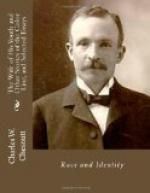“It cert’n’y is fine,” said Ben; “I wish I had one like it.” He looked at the whip longingly as Colonel Thornton drove away.
“‘Pears ter me Ben gittin’ mighty blooded,” said one of the bystanders, “drivin’ a hoss an’ buggy, an’ wantin’ a whip like Colonel Thornton’s.”
“What ‘s de reason I can’t hab a hoss an’ buggy an’ a whip like Kunnel Tho’nton’s, ef I pay fer ’em?” asked Ben. “We colored folks never had no chance ter git nothin’ befo’ de wah, but ef eve’y nigger in dis town had a tuck keer er his money sence de wah, like I has, an’ bought as much lan’ as I has, de niggers might ‘a’ got half de lan’ by dis time,” he went on, giving a finishing blow to a horseshoe, and throwing it on the ground to cool.
Carried away by his own eloquence, he did not notice the approach of two white men who came up the street from behind him.
“An’ ef you niggers,” he continued, raking the coals together over a fresh bar of iron, “would stop wastin’ yo’ money on ’scursions to put money in w’ite folks’ pockets, an’ stop buildin’ fine chu’ches, an’ buil’ houses fer yo’se’ves, you ’d git along much faster.”
“You ‘re talkin’ sense, Ben,” said one of the white men. “Yo’r people will never be respected till they ’ve got property.”
The conversation took another turn. The white men transacted their business and went away. The whistle of a neighboring steam sawmill blew a raucous blast for the hour of noon, and the loafers shuffled away in different directions.
“You kin go ter dinner, Tom,” said the blacksmith. “An’ stop at de gate w’en yer go by my house, and tell Nancy I ’ll be dere in ’bout twenty minutes. I got ter finish dis yer plough p’int fus’.”
The young man walked away. One would have supposed, from the rapidity with which he walked, that he was very hungry. A quarter of an hour later the blacksmith dropped his hammer, pulled off his leather apron, shut the front door of the shop, and went home to dinner. He came into the house out of the fervent heat, and, throwing off his straw hat, wiped his brow vigorously with a red cotton handkerchief.
“Dem collards smells good,” he said, sniffing the odor that came in through the kitchen door, as his good-looking yellow wife opened it to enter the room where he was. “I ’ve got a monst’us good appetite ter-day. I feels good, too. I paid Majah Ransom de intrus’ on de mortgage dis mawnin’ an’ a hund’ed dollahs besides, an’ I spec’s ter hab de balance ready by de fust of nex’ Jiniwary; an’ den we won’t owe nobody a cent. I tell yer dere ain’ nothin’ like propputy ter make a pusson feel like a man. But w’at ‘s de matter wid yer, Nancy? Is sump’n’ skeered yer?”
The woman did seem excited and ill at ease. There was a heaving of the full bust, a quickened breathing, that betokened suppressed excitement.
“I-I-jes’ seen a rattlesnake out in de gyahden,” she stammered.
The blacksmith ran to the door. “Which way? Whar wuz he?” he cried.




